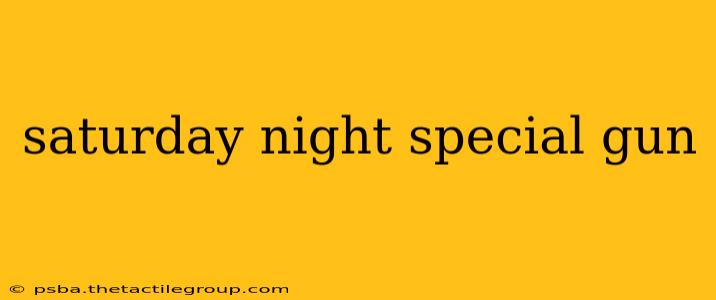The term "Saturday Night Special" conjures up images of cheap, readily available handguns often associated with crime. But what is the reality behind this evocative phrase, and what is its lasting impact on gun control debates and societal perceptions? This article delves into the history, characteristics, and ongoing relevance of these controversial firearms.
What Defines a "Saturday Night Special"?
There's no single, legally defined category for a "Saturday Night Special." The term is more of a colloquialism, referring to inexpensive, often poorly made handguns readily accessible in the past. These guns typically share certain characteristics:
- Low Manufacturing Cost: They were produced using inexpensive materials and less rigorous manufacturing processes, resulting in lower quality and potentially unreliable functionality.
- Simple Design: Often featuring rudimentary mechanisms and designs, making them easier to produce but potentially less accurate and durable.
- Easy Accessibility: Historically, these firearms were relatively easy to purchase with minimal background checks or restrictions, contributing to their association with crime.
The History and Legacy of Saturday Night Specials
The origin of the term "Saturday Night Special" is debated, but it gained prominence in the mid-20th century, reflecting a period of increased gun violence and a perception that easily accessible, cheap handguns fueled this violence. The term itself carries a negative connotation, implying that these weapons were primarily used in impulsive acts of violence, often occurring on a weekend night.
Manufacturers of these firearms often targeted low-income communities, further fueling concerns about their social impact. The ease of acquisition and affordability made them accessible to individuals who might not otherwise have been able to obtain firearms legally, leading to a strong association with crime in the public consciousness.
The Impact on Gun Control Legislation
The negative perception surrounding "Saturday Night Specials" significantly influenced gun control legislation. While not explicitly outlawed, many laws aimed to restrict the sale and distribution of inexpensive handguns. These efforts often focused on:
- Minimum Quality Standards: Legislation has been introduced in various jurisdictions to mandate minimum manufacturing standards for handguns, aiming to reduce the availability of poorly made and unreliable firearms.
- Background Checks and Waiting Periods: Strengthened background checks and waiting periods for firearm purchases have aimed to reduce the accessibility of all handguns, including those previously categorized as "Saturday Night Specials."
- Restrictions on Sales: Regulations have been implemented to limit the sale of handguns to certain individuals and restrict their sale in certain locations.
The Ongoing Debate
The debate surrounding "Saturday Night Specials" continues today. While the accessibility of inexpensive handguns has been reduced through various legislative measures, concerns remain about the availability of firearms with similar characteristics, albeit potentially under different branding or marketing.
The ongoing discussion highlights the complex interplay between gun rights, public safety, and social responsibility. It's a debate that demands a nuanced understanding of both the historical context of these firearms and the continuing challenges of gun violence prevention.
Conclusion
The "Saturday Night Special" remains a powerful symbol in the ongoing gun control debate. Understanding its history and the societal perceptions associated with it is crucial for fostering informed discussions about gun violence prevention and responsible firearm ownership. The term, while not a precise legal category, serves as a reminder of the complex issues surrounding inexpensive and easily accessible firearms and their impact on communities.

